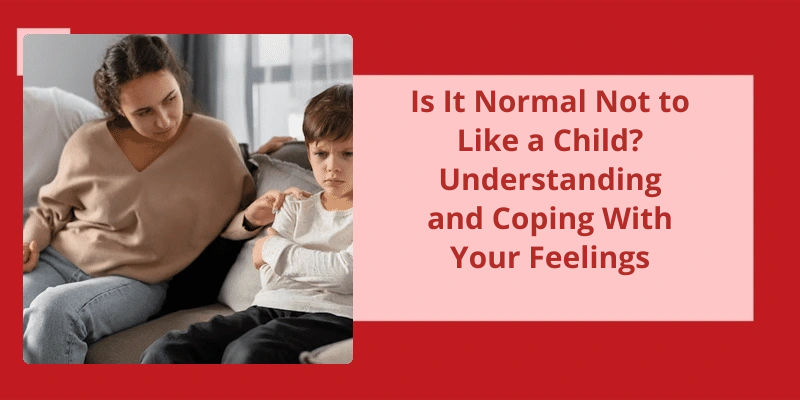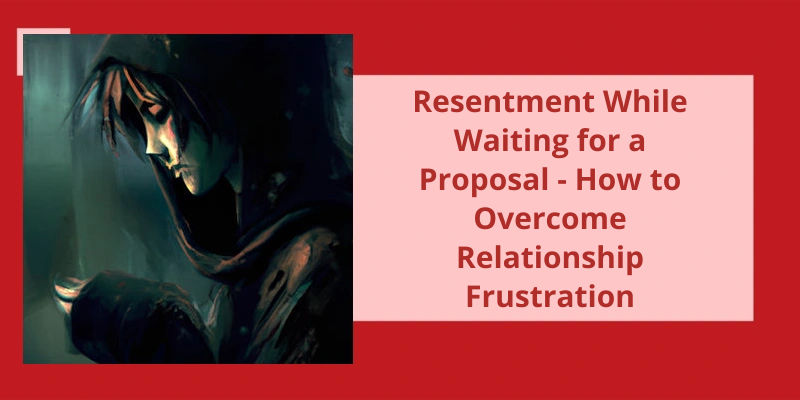The decision to not have children is a personal one and shouldn’t be taken lightly. However, what about those who do have children or interact with them on a regular basis but simply don't like them? This topic may be taboo, but it's a reality that some individuals may not enjoy being around children. It's important to understand that this doesn’t make them bad people or incapable of caring for others. Rather, it's just a personal preference and should be respected without judgment. In this article, we'll explore the reasons why someone may not like children and how to navigate this feeling in a society that puts a high value on child-rearing.
Is It Normal That I Don’t Like My Child?
Perhaps the child reminds the parent of someone they didn’t like, or they projected their own issues onto the child. It’s also possible that the parent has been struggling with depression or anxiety that’s affecting their relationship with the child. It’s important to explore these underlying reasons and seek help if needed, as prolonged dislike or resentment towards a child can be damaging to both parties.
It’s easy to feel guilty or ashamed for not liking ones own child, but it’s important for parents to realize that this is a common experience for many. Parenting is a complex and challenging journey, and it’s natural to feel overwhelmed or frustrated at times. However, it’s important to address these negative feelings in a healthy and proactive way, rather than letting them fester and harm the parent-child relationship.
It’s also possible that the child is simply going through a difficult phase, such as the terrible twos or teenage rebellion, that’s putting strain on the relationship. However, it’s important for parents to remember that these phases are temporary and don’t define the child as a whole. Learning to navigate these phases with patience and compassion can ultimately strengthen the parent-child bond.
At the same time, it’s important for parents to prioritize their own mental health and well-being. It’s okay to take a step back and seek support from friends, family, or a therapist if necessary. This can provide a fresh perspective and help parents address any underlying issues that may be affecting their relationship with their child.
Ultimately, it’s important for parents to strive for a healthy and loving relationship with their child, while recognizing that it’s normal to have ups and downs along the way. By taking a proactive approach in addressing negative feelings and seeking support when needed, parents can build a strong, positive, and lasting bond with their child.
Coping Strategies for Parents Who Don’t Like Their Child
- Seeking therapy or counseling to address any underlying issues or emotions
- Engaging in self-care activities to alleviate stress and promote well-being
- Connecting with other parents who may be facing similar challenges through support groups or online forums
- Recognizing and acknowledging positive qualities in the child and focusing on those aspects
- Creating boundaries and setting expectations for behavior while still showing love and support
- Exploring alternative parenting styles or techniques that may better suit the parent-child dynamic
- Discussing concerns with a trusted friend or family member for additional support and perspective
It’s important to take the time and explore your own feelings and desires when it comes to parenthood. Making this decision is a deeply personal one and shouldn’t be dictated by societal expectations or pressure from others. In the following sections, we’ll explore some common reasons people may choose not to have children and offer some tips for navigating this decision.
Is It Ok to Not Want to Be a Parent?
Being a parent is a huge responsibility and commitment. It requires a selfless attitude, mental and emotional preparation, and financial stability. Not everyone is cut out for it, and thats perfectly normal. Some people simply don’t have the desire or inclination to be a parent, and thats perfectly OK.
Bringing a child into the world should be a decision made for oneself, not for others. It’s important to take the time to evaluate ones desires and goals in life, and to make a decision that aligns with those personal values.
In addition, being a parent isn’t the only fulfilling path in life. There are countless other ways to make a positive impact on the world, and to lead a meaningful and fulfilling life. Pursuing a career, engaging in hobbies, volunteering, and fostering relationships with friends and family can all bring a sense of purpose and joy. It’s important to remember that ones worth isn’t tied to their ability or desire to have children.
Parenting is a tough journey, and it’s understandable that sometimes we may feel frustrated or disconnected from our children. However, it’s important to address these feelings and find ways to improve the relationship. In this article, we’ll explore some strategies for managing difficult emotions and building a stronger bond with your child.
What Do I Do if I Don’t Like My Child?
Many parents struggle with the challenge of liking their children. It’s normal to have negative thoughts towards your child from time to time. However, it becomes a problem when you frequently feel overwhelmed by feelings of dislike. As a parent, it’s essential to acknowledge your feelings and identify the cause of your emotions.
It’s essential to manage your expectations realistically. Sometimes, as parents, we hold unrealistic expectations of our children. This can cause disappointment and frustration when our expectations aren’t met. By managing your expectations, you can minimize the feeling of disappointment towards your child, which can reduce your dislike.
Take the time to get to know your child better. As you learn more about their likes, dislikes, fears, and personality, you can develop a deeper understanding of your child. With a deeper understanding comes a higher level of empathy towards them. By creating this bond, you can reduce feelings of dislike and increase feelings of affection.
Try to stay positive when interacting with your child. When you focus on their positive qualities, it becomes easier to like them. While it’s important to discipline your child when necessary, you should focus on the positives as well. Positive reinforcement can help reinforce what you like about your child.
Lastly, commit to not criticizing your child. By avoiding criticism, you can create an environment where your child feels comfortable being themselves. This can help strengthen your relationship, making it easier to find common ground.
It isn’t uncommon to clash with your childs personality. As they grow older, they develop personalities that may differ from yours, which can result in tension. It’s important to remember that differences in personality don’t equate to dislike. Finding common ground can help build a stronger relationship that can withstand personality differences.
It isn’t easy to like our children at all times. It’s essential to acknowledge your feelings and identify the root cause of your dislike. Managing your expectations, getting to know your child better, staying positive towards them, committing to not criticizing them, and finding common ground can help strengthen your relationship with your child. With effort and patience, you can learn to love your child fully.
The Importance of Seeking Professional Help if Feelings of Dislike or Resentment Towards Your Child Persist or Become Overwhelming
- Don’t ignore or suppress negative emotions towards your child.
- Recognize when these emotions become persistent or overwhelming.
- Seek professional help from a therapist or psychologist.
- Professional help can assist with identifying the root cause of these emotions and developing effective coping strategies.
- Ignoring these emotions can lead to long-term negative effects on both the parent and child.
Parenting can be an overwhelming experience, especially when you’re unsure if your baby likes you or not. It’s natural to want your child’s affection and attention, but what if they seem indifferent or even resistant to your presence? You might start to wonder if there’s something wrong with your baby or your parenting style. This feeling can be amplified if you’ve heard of Reactive Attachment Disorder and worry that your child may be suffering from this condition.
Is It Normal to Think Your Baby Doesn’t Like You?
It’s normal for parents to feel a range of emotions when they’ve a new baby, including a sense of joy, happiness, and love. However, some parents may also experience feelings of doubt or worry, especially if their baby doesn’t seem to respond to them in the way they expect. For example, if a baby doesn’t seem to want to be held by their parents or doesn’t seem to miss them when theyre away, it’s easy to begin to question whether the baby likes them or not.
One thing to keep in mind is that babies have a limited ability to express themselves, especially in the early months of life. They may not have the ability to smile or show affection in the way that older children or adults can, so it can be difficult to know how they feel about anyone, including their parents. Additionally, babies may simply have different temperaments and ways of expressing their needs and emotions, so a baby who doesn’t seem to want to be held may simply prefer to explore their environment independently.
However, if a parent is concerned that their baby doesn’t seem to like them or doesn’t seem to bond with them, it’s important to speak with a healthcare provider. In some cases, the lack of bonding between a parent and child may be a sign of a condition called Reactive Attachment Disorder. This is a rare but serious condition that can occur when a baby misses out on the critical early bonding time with their mother or caregivers, usually due to severe neglect or abuse.
If left untreated, Reactive Attachment Disorder can have long-term effects on a childs emotional and psychological development. It’s important to seek help as soon as possible if a parent suspects that their baby may be experiencing this condition. This may involve working with a mental health professional to help both the parent and child learn healthy attachment behaviors and overcome any challenges that may be getting in the way of bonding.
In most cases, however, it’s important for parents to remember that they’re doing the best they can and that a babys inability to express themselves doesn’t mean they don’t love or appreciate their parents. Bonding with a baby is a gradual process that takes time and patience, and it’s important to focus on building that connection in small but meaningful ways, such as through eye contact, touch, and talk. By being present and attentive to their babys needs, parents can help lay the foundation for a strong and healthy bond that will last a lifetime.
Tips for Coping With the Stress and Challenges of Parenting a Newborn
- Get enough rest and sleep when possible.
- Find a support system, like friends or family, who can help you out.
- Talk to other parents and share your experiences.
- Take breaks and find ways to relax, like deep breathing or meditation.
- Be realistic about your expectations and goals.
- Don’t be afraid to ask for help or seek professional support.
- Remember to take care of yourself, both physically and mentally.
- Focus on the positive moments and celebrate small accomplishments.
- Be flexible and willing to adjust your plans as needed.
- Take time to bond with your baby and enjoy the experience.
Conclusion
It's crucial to recognize and respect individual choices when it comes to parenthood. Whether someone doesn't like children or simply doesn't want them, it's their right to make that decision without judgement or societal expectations. No one should be made to feel guilty or shamed for their feelings towards children or their decision to not have them. It's essential to open up discussions about the different paths people may take in life, and break down the stigma surrounding non-traditional family dynamics. Ultimately, the most important thing is for everyone to make choices that align with their values and bring them happiness and fulfillment.






